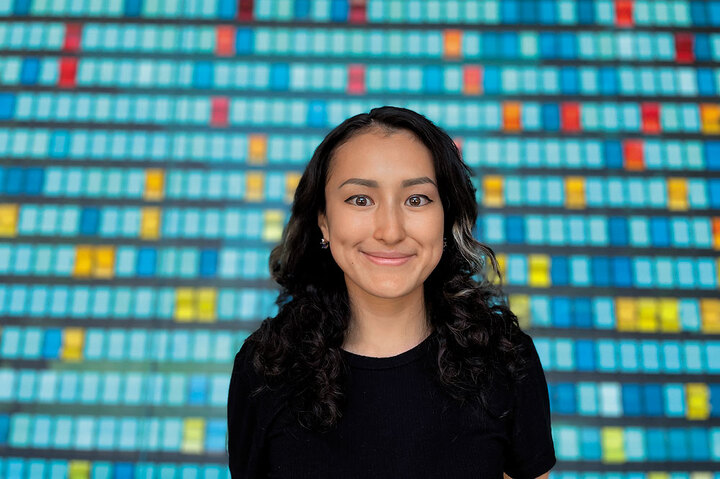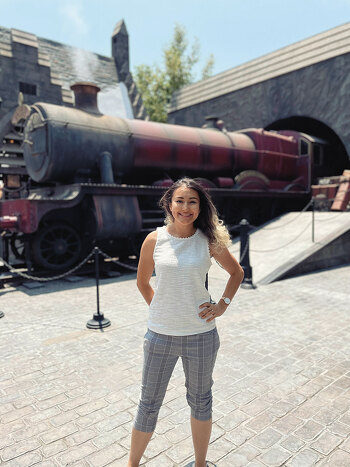
The increase in the corporation was approved with the highest indicator of academic performance.
Malika Aubakirova, who was featured in the 30 Under 30 by the Forbes Kazakhstan, considers participation in the FLEX exchange program for high school students in 2010 to be a turning point in her life, as it largely determined her professional future. By that time, her family had moved from Karaganda to Astana. Malika studied at the Moscow Lyceum No. 9 and excelled in math (another alumni is Azat Suleimenov, engineer of the American company Lucid Motors featured in the the 30 Under 30 rating).
"While we were waiting for our turn for the test, a friend wanted us to go to a cafe to eat pizza. I was tempted to leave, since the chances to pass the test and get to study in America for me were scarce. It seemed I had a better chance of getting to Mars. Nevertheless, I passed all three rounds and was among the ten students who went to the USA.
I lived in California in a farmer's family. It was a unique experience - to arrive at someone's house, not knowing how to behave and what the rules are. But the host family was very kind to me, we are still friends," says 29–year-old Malika.
A year in an American family and at a local school improved her English – the Kazakh girl even became one of the best in her class. She also changed her worldview: the prospect of getting a higher education in the United States no longer seemed unrealistic. Although, says Malika, the family was tight on money, so her parents would not be able to afford the tuition. After returning to her homeland, she graduated from school with Altyn Belgi (Gold Medal). In 2012 she began applying for grants to leading universities in the USA, which usually have support programs for talented foreign students.
Malika recalls that she didn't quite understand how competitive she was compared to her peers, but in the end she received invitations from several universities and chose the Department of Computer Science at the University of Chicago, one of the leading in science and economics. During her school years, Malika participated in international math competitions, but she understood that a Computer Science major was more practical.
However, it turned out that the departure to Chicago had to be postponed – Malika was seriously injured and spent almost nine months in the hospital. She had to write to the university and take a gap year (a break between graduation and the beginning of her studies at the university).
"On the one hand, it was very unfortunate, on the other – I had time to think carefully about everything: when you have both legs broken, your attitude to life inevitably changes. Our school hardly had any programming classes, and I took the opportunity to master its basics – I studied sites where you could create your own pages, make animations and other customized solutions," she says.
The gap year brought benefits: she self-trained and attended special courses at Nazarbayev University after recovery.
Studying her future specialty, Malika realized that programming is much more complicated than it seemed at first glance and that being a programmer is not just fixing routers or configuring an operating system. After arriving to study in Chicago in 2013, she watched The Internship movie, which had just been released.
Malika recalls with a smile that the movie showed the world-famous Google campus, where the company's employees had, among other things, access to free coffee in unlimited quantities. And Malika, a big fan of this drink, decided that this must be a dream job. She didn't realize then that her efforts and achievements would lead to an invitation from Google.
One of the advantages of the University of Chicago, says Malika, is the ability to build a fairly flexible curriculum: a Computer science student, for example, can also choose economics or language classes. Another advantage was the opportunity to attend training programs in different countries of the world. For example, after her first year, Malika took an internship in China as part of one of the initiatives of then US President Barack Obama aimed at bringing the two superpowers closer.
And in 2015 she found herself in the longed-for Google – again as an intern. This was her first acquaintance with a global corporation: a year later, a Kazakh woman took an internship there again.
She also had a great opportunity to participate in the scientific life of the student community. Malika took part in hackathons, did scientific projects on artificial intelligence and machine learning. Her scientific works were cited in almost 30 other pieces.
She also could not refuse an opportunity to work in the team of the Affirm startup - one of the creators of PayPal, a well-known investor and programmer Max Levchin. The largest electronic payment system PayPal and fintech Affirm challenge traditional banking systems to some extent. Therefore Malika, as a computer science specialist and a student who devoted a lot of time to studying economic processes, was interested in this area.
"My manager at Affirm was one of the first engineers of the company, I occupied the office opposite Levchin himself. Many employees were so cool that later they came up with their own startups," Malika says.
However, after marriage, Malika reconsidered her priorities - the family came out on top. When seeking employment after graduation, she preferred Google, instead of her own startup, as it was more reliable. Malika says that during the time spent in the Google team she managed to work on many products: Google Translate, Google Chrome, Google search engine.
Her next division was Chronicle Security, a cybersecurity product under the Google Cloud Platform. Despite the novelty, this project is one of the most important in the Google structure, since it is related to cybersecurity and data security.
"The task of my team was not to prevent cyber attacks, but to securely store data, and this is a very serious topic. It is difficult for companies to control a huge amount of data, so often some of the data is simply deleted. Attackers can gain access to passwords and other information, and the company will not notice the increased risk. The Google platform processes data and shows customers possible vulnerabilities," explains Malika.

Over the years of working at Google, she has been promoted to the senior engineer – fairly high in the corporate ladder. The promotion was approved on the second request, but Malika had the highest performance rate, which is rare even among experienced employees of the corporation.
During the tragic days of January 2022, Malika initiated an official community of Kazakhs working at Google. She says, 60-70 of her compatriots work in the company, although when Malika took her first internship, there were only a few of them. A sort of "Kazakh boom" happened at Google.
The community, in particular, collects donations that go to support social and charitable public organizations in Kazakhstan - for example, to help people with disabilities. In accordance with corporate rules, Google donates an amount similar to the amount collected.
Malika is sure that Google is one of the best companies in the world today.
"There are many companies in Silicon Valley offering high salaries to qualified people. But Google is unique, and its structure ensures this uniqueness. Now that I have started to study business in depth, I understand this even more clearly.
For example, Google's peer-bonus system allows you to make a gift to an employee working at the same level if he helped you with work. It's great to express your gratitude not just verbally, but you also can indicate in your resume how many colleagues you helped. It encourages the corporate spirit, rather than 'the law of the corporate jungle', where the strongest survive," Malika says.
Malika has always tried to tie her future with technology and business. Eventually she opted for the latter after participating in the MS/MBA programs at Harvard Business School, Harvard John A. Paulson School of Engineering and Stanford Graduate School of Business. At the end of September, she left her job at Google and moved to Stanford with her family.
Malika is sure that the Stanford University business School is an ideal place for a future entrepreneur to get necessary knowledge, while Silicon Valley is the best place to apply this knowledge in practice.
"The acceptance rate at Stanford Business School is only 6%, making it an exclusive school. Many of my classmates have worked in the UN, in the non-governmental sector. These people have achieved incredible success and I could learn a lot from them. In addition, almost all venture capital funds investing in startups are located in Silicon Valley, so there is an opportunity to make connections in this sector.
I hope my work experience at Affirm and Google, and Stanford education will help in the future. Besides creating my own startup, I am interested in participating in projects with great potential at early stages. It would be interesting to work with projects on cybernetics, data processing, information security, possibly fintech," Malika shares her plans.
She believes the market today offers unique chances for startups. Facing recession, large companies are laying off employees. While university graduates struggle with employment in the corporate sector, startups can attract talent. Global economy makes it possible anywhere in the world. Perhaps, Malika argues, in a couple of years this will lead to the emergence of a new wave of successful technology companies.
Recalling the years spent at Google, she notes that the corporation does not close its doors to former employees. This means that Malika always has the opportunity to return to the positions of senior engineer or senior manager.
"I probably have a bit of a Soviet mentality, it is important for me to have a safety cushion, to know that I can return to my previous job at any time without losing my position. But I would like to think that I will be able to achieve my goals, without relying on the safety cushion," Malika smiles.